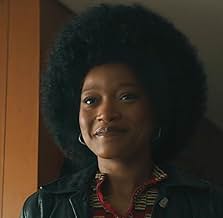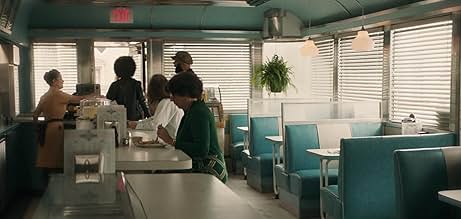AVALIAÇÃO DA IMDb
5,6/10
3,4 mil
SUA AVALIAÇÃO
Uma escrava no Sul escapa da sua plantação isolada apenas para descobrir uma realidade chocante para além da linha das árvores.Uma escrava no Sul escapa da sua plantação isolada apenas para descobrir uma realidade chocante para além da linha das árvores.Uma escrava no Sul escapa da sua plantação isolada apenas para descobrir uma realidade chocante para além da linha das árvores.
- Prêmios
- 2 vitórias e 8 indicações no total
Enredo
Você sabia?
- CuriosidadesThe story is based on the very real history of black Americans still being enslaved even after the Emancipation Proclamation. The most prominent example of this, on which the movie is based, is the life of Mae Louise Walls Miller. She didn't get her freedom until 1961, when she ran away from the plantation and found a family that rescued her and her family. She and her family were unaware that things had changed, as they had no TV or other access to the outside world; they just assumed their situation was like that for all black people.
- Erros de gravaçãoVHS wasn't released commercially until 1976, yet there is a Polaroid VHS on the counter in 1973.
- ConexõesFeatures Sanford and Son (1972)
- Trilhas sonorasBrother's Gonna Work It Out
Written by Willie Hutch
Performed by Willie Hutch
Courtesy of Motown Records under license from Universal Music Enterprises
Avaliação em destaque
Elements of the film's background are loosely based on the narrative of Mae Louise Walls Miller, who escaped from slavery in 1963.
Nearly five years after the Waterford meeting, however, Mae Louise Walls Miller of Mississippi told Harrell that she didn't get her freedom until 1963. Miller told her about how she and her mother were raped and beaten when they went to the main house to work.
Since that time, Harrell has continued her research and documenting their story.
Over time, she said the "modern day slaves" did leave Waterford Plantation as their offspring were able to attend college or buy a home. While many of their parents, by then in their 70s and in poor health, knew they were free but still stayed where they were or went to another plantation. But she added they encouraged their children "to move ahead and take their liberties or freedom."
Nearly five years after the Waterford meeting, however, Mae Louise Walls Miller of Mississippi told Harrell that she didn't get her freedom until 1963. Miller told her about how she and her mother were raped and beaten when they went to the main house to work.
Since that time, Harrell has continued her research and documenting their story.
Over time, she said the "modern day slaves" did leave Waterford Plantation as their offspring were able to attend college or buy a home. While many of their parents, by then in their 70s and in poor health, knew they were free but still stayed where they were or went to another plantation. But she added they encouraged their children "to move ahead and take their liberties or freedom."
- harley-08810
- 6 de abr. de 2022
- Link permanente
Principais escolhas
Faça login para avaliar e ver a lista de recomendações personalizadas
- How long is Alice?Fornecido pela Alexa
Detalhes
- Data de lançamento
- País de origem
- Central de atendimento oficial
- Idioma
- Também conhecido como
- 愛麗絲
- Locações de filme
- EUA(Location)
- Empresa de produção
- Consulte mais créditos da empresa na IMDbPro
Bilheteria
- Faturamento bruto nos EUA e Canadá
- US$ 373.043
- Fim de semana de estreia nos EUA e Canadá
- US$ 173.614
- 20 de mar. de 2022
- Faturamento bruto mundial
- US$ 373.043
- Tempo de duração1 hora 40 minutos
- Cor
Contribua para esta página
Sugerir uma alteração ou adicionar conteúdo ausente

























